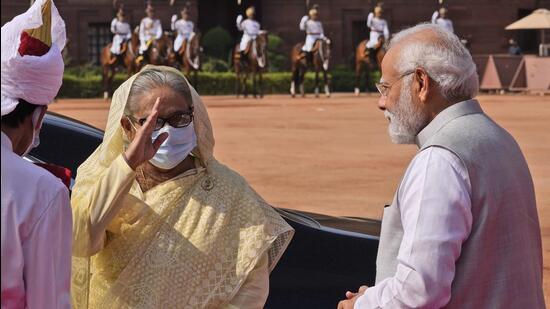The use of Indian ports for trans-shipment of goods such as raw materials for Bangladesh’s ready-made garments sector, will lead to a win-win situation for the two sides, Bangladeshi Prime Minister Sheikh Hasina was on a four-day visit to India earlier this month on a tour to boost bilateral ties.
India has proposed several measures to Bangladesh to boost trade and connectivity between the two sides, including greater trans-shipment of goods via Indian ports and the import of tea from India’s northeastern states, people familiar with the matter said.
The measures were outlined to the Bangladeshi side during Prime Minister Sheikh Hasina’s visit to India during September 5-8. Trade and connectivity, especially initiatives to forge greater rail, waterway and energy linkages centred around India’s northeastern states, have emerged as a key pillar of bilateral ties in recent years.
The use of Indian ports for trans-shipment of goods such as raw materials for Bangladesh’s ready-made garments (RMG) sector, a key part of the neighbouring country’s exports, will lead to a win-win situation for the two sides, the people cited above said.
Bangladesh currently imports a large volume of raw materials for its RMG sector, and these goods need to reach factories in a timely manner so that they can fulfil orders placed by European and American buyers. The vessels of international shipping lines usually leave containers with raw materials bound for Chattogram port at ports in Singapore, Colombo or Tanjung Pelepas in Malaysia, from where feeder ships carry them to Bangladesh.
The RMG sector is time-sensitive because of shifting trends in the fashion industry and any delay in trans-shipment can affect the ability of Bangladeshi exporters to export larger quantities to global markets, the people said.
An arrangement with Indian ports can help bring in cargoes bound for Chattogram port and dispatch them at a faster rate, the people said. Such an arrangement will also cut down the shipping time to Chattogram port, which is three to four days in the case of Colombo and Singapore ports and just two days in the case of ports on India’s east coast.
“The business community in both countries see this as an opportunity,” one of the people cited above said.
Colombo port is currently affected by a severe logjam, with trans-shipment containers stuck for up to 25 days. The delay at Singapore port is about 15 days, and an arrangement with Indian ports will help Bangladeshi importers avoid trans-shipment delays, the people pointed out.
The Indian side also pitched several proposals focused completely on the northeastern states, such as the import of tea from Assam by Bangladesh and greater collaboration in the textiles sector. Besides India, Bangladesh mainly imports tea from Kenya, Singapore, China and the United Arab Emirates. The people pointed out that buying tea from Assam would cut down costs in areas such as transportation.
“While Bangladesh has a developed textiles sector, the northeastern states have expertise in areas such as design. There is a National Institute of Fashion Technology (NIFT) in Shillong and such institutions can foster collaboration in this area,” the person cited above said.
Bilateral cooperation focused on the northeastern states came up for discussion when the minister for development of the northeastern region, G Kishan Reddy, met Prime Minister Hasina in New Delhi on September 7.
Source: Hindustan Times






